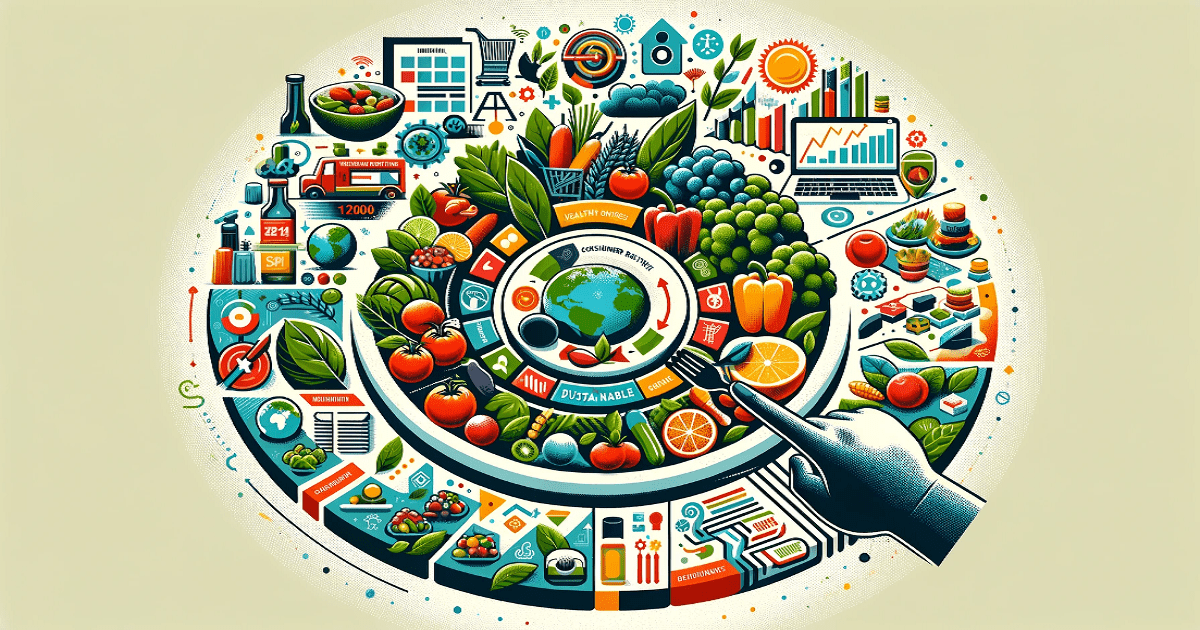Nutritional Choices and Consumer Behavior: Steering towards Sustainable Health Outcomes
A special issue of Sustainability (ISSN 2071-1050). This special issue belongs to the section "Sustainable Food".
Deadline for manuscript submissions: closed (11 November 2024) | Viewed by 3865

Special Issue Editors
Interests: public health nutrition and obesity; food environment interventions; digital and social media; dietary behavior change; nutritional health promotion; translational research
Special Issues, Collections and Topics in MDPI journals
Interests: wearable electronic devices; digital and social media; nutritional health promotion; translational research; sustainable nutrition
Special Issue Information
Dear Colleagues,
Global health and environmental sustainability are becoming increasingly interconnected; therefore, understanding the impact of food on consumer health and behavior is important. The global food system is a significant contributor to climate change, and, conversely, climate change poses a considerable risk to food security and nutrition. The rising incidence of non-communicable diseases linked to dietary choices underscores the need for a deeper understanding of the relationship between food, health, and consumer behavior.
This Special Issue focuses on the connection between what consumers eat and how it affects their health, as well as how their choices impact the environment. It aims to explore the intersection of nutrition, public health, consumer habits, and environmental sustainability.
The aim of this Special Issue is to gather and disseminate high-quality research that explores how food choices impact consumer health and influence behavior, and how these, in turn, contribute to sustainable development goals. This aligns with MDPI Sustainability's focus on transdisciplinary research that promotes scientific understanding and supports the global agenda for sustainable development.
By exploring topics ranging from nutritional science and public health to consumer psychology and sustainable food systems, this Special Issue intends to contribute to the broader discourse on how individual and collective food choices can drive us towards a more sustainable and healthier future.
In this Special Issue, original research articles and reviews are welcome. Research areas may include (but are not limited to) the following:
- Nutritional sustainability: studies focusing on the connection between healthy dietary patterns and environmental sustainability;
- Consumer behavior in food choices: research on how consumers make food choices, influenced by factors like food environment, marketing, cultural norms, and socio-economic status;
- Impact of diet on health outcomes: insights into how different diets contribute to or mitigate health risks, particularly chronic diseases;
- Sustainable food systems and policies: exploration of how food systems can be made more sustainable and the role of policy in shaping consumer behavior towards sustainable diets;
- Technological advances in food and nutrition: the role of technology in enhancing food sustainability and health, including innovations in food production and nutrition science;
- Educational interventions and public awareness: studies on the effectiveness of educational programs and health promotion interventions in promoting healthy and sustainable food choices.
We look forward to receiving your contributions.
Dr. Rajshri Roy
Dr. Virginia Chan
Guest Editors
Manuscript Submission Information
Manuscripts should be submitted online at www.mdpi.com by registering and logging in to this website. Once you are registered, click here to go to the submission form. Manuscripts can be submitted until the deadline. All submissions that pass pre-check are peer-reviewed. Accepted papers will be published continuously in the journal (as soon as accepted) and will be listed together on the special issue website. Research articles, review articles as well as short communications are invited. For planned papers, a title and short abstract (about 250 words) can be sent to the Editorial Office for assessment.
Submitted manuscripts should not have been published previously, nor be under consideration for publication elsewhere (except conference proceedings papers). All manuscripts are thoroughly refereed through a single-blind peer-review process. A guide for authors and other relevant information for submission of manuscripts is available on the Instructions for Authors page. Sustainability is an international peer-reviewed open access semimonthly journal published by MDPI.
Please visit the Instructions for Authors page before submitting a manuscript. The Article Processing Charge (APC) for publication in this open access journal is 2400 CHF (Swiss Francs). Submitted papers should be well formatted and use good English. Authors may use MDPI's English editing service prior to publication or during author revisions.
Keywords
- sustainable nutrition
- consumer food behavior
- health and diet outcomes
- food system sustainability
- dietary policy and education
Benefits of Publishing in a Special Issue
- Ease of navigation: Grouping papers by topic helps scholars navigate broad scope journals more efficiently.
- Greater discoverability: Special Issues support the reach and impact of scientific research. Articles in Special Issues are more discoverable and cited more frequently.
- Expansion of research network: Special Issues facilitate connections among authors, fostering scientific collaborations.
- External promotion: Articles in Special Issues are often promoted through the journal's social media, increasing their visibility.
- Reprint: MDPI Books provides the opportunity to republish successful Special Issues in book format, both online and in print.
Further information on MDPI's Special Issue policies can be found here.






